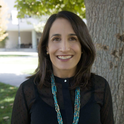Mirroring the heterogeneity of Spanish-speaking bilingual teachers and students in the United States, the authors reflect on their diverse linguistic and cultural backgrounds to interrogate what it means to be “linguistically qualified” to prepare bilingual teachers in the United States. Through critical collaborative autoethnographies, they problematize the question of who is “linguistically qualified” to do this work and ask how universities can better prepare bilingual teacher education faculty for the distinct challenges they face so that they can thrive rather than survive and, in turn, better prepare future bilingual teachers. This article proposes three guiding principles for preparing and sustaining linguistically diverse bilingual teacher educators: (a) explore and develop language ideologies and equitable pedagogies; (b) develop and maintain critical consciousness to examine intersectional identities that include race, gender, sexual orientation, language, ethnicity, social class, and immigration status; and (c) incorporate explicit navigation of the politics of bilingual education and provide opportunities for networking and mentoring.
Available at: http://works.bepress.com/allison-briceno/72/
